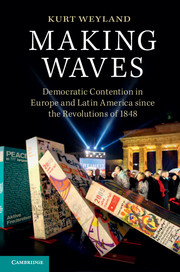Book contents
- Frontmatter
- Contents
- Acknowledgments
- 1 Introduction: Puzzling Trends in Waves of Contention
- 2 A New Theory of Political Diffusion: Cognitive Heuristics and Organizational Development
- 3 Organizational Development and Changing Modes of Democratic Contention
- 4 The Tsunami of 1848: Precipitous Diffusion in Inchoate Societies
- 5 The Delayed Wave of 1917–1919: Organizational Leaders as Guides of Targeted Contention
- 6 The Slow but Potent “Third Wave” in South America: The Prevalence of Negotiated Transitions
- 7 Crosscurrents of the Third Wave: Interorganizational Competition and Negotiation in Chile
- 8 Theoretical Conclusions and Comparative Perspectives
- Bibliography
- Name Index
- Subject Index
5 - The Delayed Wave of 1917–1919: Organizational Leaders as Guides of Targeted Contention
Published online by Cambridge University Press: 05 June 2014
- Frontmatter
- Contents
- Acknowledgments
- 1 Introduction: Puzzling Trends in Waves of Contention
- 2 A New Theory of Political Diffusion: Cognitive Heuristics and Organizational Development
- 3 Organizational Development and Changing Modes of Democratic Contention
- 4 The Tsunami of 1848: Precipitous Diffusion in Inchoate Societies
- 5 The Delayed Wave of 1917–1919: Organizational Leaders as Guides of Targeted Contention
- 6 The Slow but Potent “Third Wave” in South America: The Prevalence of Negotiated Transitions
- 7 Crosscurrents of the Third Wave: Interorganizational Competition and Negotiation in Chile
- 8 Theoretical Conclusions and Comparative Perspectives
- Bibliography
- Name Index
- Subject Index
Summary
The Russian Revolutions of 1917 provided powerful impulses for political change in Europe and beyond (Hobsbawm 1996c: 65) and helped to trigger a number of contentious transitions to democracy. But this diffusion wave differed starkly from the riptide of 1848. Above all, it advanced more slowly but attained greater success in producing actual progress toward democracy. A year or more elapsed between the triggering events of February and October of 1917 and the suffrage reforms and overthrows of monarchies that a number of European countries experienced starting in late 1918. Why this delay in the initiation of externally stimulated regime contention? And why did the variegated attempts to cross the threshold to full democracy that eventually gathered steam reach their goals so often? What accounts for the distinctive features of democratic diffusion in the early twentieth century and the differences from the tsunami of the mid-nineteenth century?
The present chapter answers these questions by introducing organizational macro-structures into the micro-foundational framework applied in Chapter 4. The emergence of mass parties and trade unions in the late nineteenth century reshaped the operation of cognitive heuristics and affected their impact on political information-processing and decision-making; as a result of this interaction, the characteristics of democratic diffusion changed. Specifically, the rise of large-scale organizations took the effective decision about participating in emulative regime contention out of the hands of common people and transferred this responsibility to representative leaders, from whom many citizens came to take cues. Due to their institutional positions and the extensive political experience required for reaching them, these leaders disposed of much better information and had greater processing capacity than ordinary people. Having a firmer grasp of political developments and facing a narrower band of uncertainty, they relied less heavily on cognitive shortcuts, were less prone to rash inferences, and therefore acted less precipitously. Certainly, like all mortals, they also applied inferential heuristics, but the resulting conjectures and judgments were anchored by more solid information. Moreover, leaders had the opportunity to discuss these inferences with their advisors and their intraorganizational rivals. For these reasons, they acted with moderately bounded rationality – distant from the norms of full rationality, but also from the tightly bounded rationality that characterizes ordinary citizens and radical sects. It follows that mass parties and trade unions do not tend to respond to external precedents with immediate emulation efforts.
- Type
- Chapter
- Information
- Making WavesDemocratic Contention in Europe and Latin America since the Revolutions of 1848, pp. 125 - 155Publisher: Cambridge University PressPrint publication year: 2014



